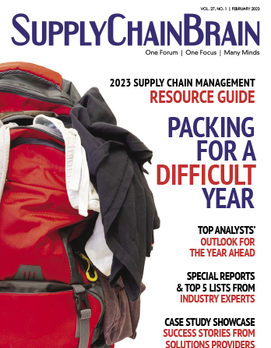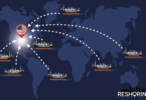
Home » Most Supply Chains Are Not Ready for Due Diligence Compliance
SCB FEATURE
Most Supply Chains Are Not Ready for Due Diligence Compliance
Strasbourg, France - July 11, 2015: Uyghur human rights activists participate in a demonstration to protest against Chinese government's policy in Uyghur. Photo: iStock.com/AdrianHancu
April 11, 2023
The excuse is the dense complexity of supply chains. The danger lies in a lack of realization that due diligence is not just a series of regulations, coming in battalions — it’s a shift in culture. One way or another, supply chain management is going to experience a top-to-bottom change in attitude regarding what constitutes corporate responsibility. And it seems that most companies are either reluctant, or not ready, or both.
Take the recent example of the drug-resistant bacteria tied to over-the-counter eye care products imported into the U.S. from India. The New York Times reports that, in early 2023, three deaths, eight cases of blindness and dozens of infections were traced to EzriCare artificial tears, leading to a widespread recall.
Global Pharma, which manufactured the products, said it had “not determined whether our manufacturing facility is the source of the contamination.” EzriCare said on its website that it marketed the drops, but that it had no role in the “actual manufacturing of this product.” Walmart and Amazon.com, among the larger retailers that sold the drops, did not respond to requests for comment. Such examples of passing (or simply avoiding) the buck remain common.
At present, the focus of much new due diligence regulation is on forced labor. For example, the German Supply Chain Due Diligence Act (or LkSG, an acronym for the act's German-language name) came into force on January 1, 2023. It obligates companies with 3,000 or more employees in Germany to take “appropriate measures” to respect human rights and the environment within their supply chains, “with the goal to prevent or minimize risks related to human rights or the environment or end the violation of duties related to human rights or the environment.”
Meanwhile, in June, 2022 the U.S. enacted its monumental supply chain due diligence law, the Uyghur Forced Labor Prevention Act, which empowers U.S. Customs and Border Protection to seize any imported merchandise goods suspected of containing forced labor. Canada, which had been criticized for being slow to respond to forced labor in the supply chain, has proposed its own due diligence law which could go into effect as early as 2023.
Other issues are likely to follow suit. The European legal initiative for a Corporate Sustainability Due Diligence Directive (CSDDD) on due diligence in supply chains is now more concrete and will have further impact on the supply chain related laws of Germany and the other member states.
Biswaranjan “Bish” Sen, a senior product supply chain officer at Unilever, said at the recent ProMat 2023 conference in Chicago that he imagined it would not be long before consumer products bore detailed information about their carbon footprint, in a way commensurate with the in-depth nutrition facts that have emerged on food packaging over the last 30 years.
It does seem likely that consumers will increasingly demand to know the goods they're buying aren't made with forced or child labor, are made with consideration of waste and energy conservation and are free from drug-resistant pseudomonas aeruginosa. So far, though, implementing the necessary changes appears to be a tall order. Supply chain transparency, which could also be characterized as visibility, has been the holy grail of supply chain management for decades now. What’s more challenging is figuring out how to change sourcing strategies or, even better, force or foster change in existing sources.
It's a daunting task. The simple reason is globalization. When we went cheap, we went dark, too. Goods manufactured in Asia, particularly China, are notorious for emerging from the gloom of layers and layers of middlemen that obscure their actual origin. Manufacturers and raw materials providers offering rock-bottom prices in countries with less rigorous laws or enforcement tend to cut corners, plain and simple. Some do so by employing children or unpaid workers; others by failing to keep quality and hygiene standards where they need to be.
“Shockingly, a lot of companies don’t even know who they’re doing business with,” says Erika Peters, global head of innovation & operations at Exiger, a global risk and compliance software company.
It's tempting to imagine the recent upheavals in international supply chains prompting change; it’s more realistic to hope change will come from persistent consumer pressure, aided by technology. The Financial Times, in a March 24 article titled: “So you think you know your supply chain?” observed that “in sectors such as footwear and apparel, which have faced particular scrutiny, the years of effort have begun to pay off."
Read more: Uniqlo Parent to Audit Working Conditions at Third-Tier Suppliers
At the same time, says the FT, innovators have developed technologies that can track product back to individual factories, fisheries and plantations.
But the majority of companies aren't ready to implement meaningful supply chain due-diligence programs, Peters says. “There are some companies, depending on the industry, where supply chain management in general has more insight into the supply chain because of the industry they’re in, and they’re less reliant on everything running smoothly.” But generally, these new regulations are forcing companies to acknowledge the risks that lurk in their supply chains, and that they’re not where they need to be, Peters adds. “Most companies are reactive, and will still do what’s best for the bottom line. They’re trying to figure out what they’re required to do. And, with that, there’s still some growth in terms of having a more robust program.”
Peters is optimistic that enforcement — mostly in the form of fines — is coming. But, she says, there’s currently no poster child in terms of an industry or company embracing true supply chain diligence. “I talked to some auto industry companies that I thought were really doing it right," she says. "They really need to know their supply chain, because it’s such a mature industry from a manufacturing point of view." But then, in December, 2022, Sheffield Hallam University’s Helena Kennedy Centre for International Justice in the U.K. published a paper titled “Driving Force: Automotive Supply Chains and Forced Labor in the Uyghur Region,” showing that several major international auto manufacturers, including Volkswagen Audi Group, Honda, Ford, General Motors, Mercedes-Benz Group, Toyota, Tesla, Renault, NIO, and Stellantis Group, had several supply chain exposures to the Uyghur Region.
Read more: The Tough Road to Responsible Sourcing for EV Automakers
“It was kind of disappointing because I thought auto manufacturers were in the best position," Peters says. "But just because they have such a great knowledge of their supply chains doesn’t mean they know all the risks. And you do have to look through a risk lens when it comes to due diligence. It’s not just supply chain managers. It has to come from a compliance point of view.”
Compliance can be expensive, though. The Economist reports that businesses say the German government’s own estimates of the law’s direct cost to the country’s firms in time and toil — €110 million ($120 million) in 2023, and €43.5 million ($47.5 million) a year thereafter — are unrealistically low.
Peters argues that the best approach is to seek to effect change. Retailers and manufacturers have a lot of leverage with their suppliers, after all. Once you know there’s a problem, what do you do about it? Peters says simply dumping a supplier is probably the most disruptive option, and also in many ways the least good one. Going to a supplier’s site and gathering required documentation can demonstrate that you’ve made a “reasonable effort” to be compliant with the German law. But the best solution, in most cases, is to deepen the relationship and offer genuine solutions. “Go to the sites," advises Peters. "Develop an understanding of exactly what’s going on there, and who’s working there. In my personal view, that’s where I would love the world to go with suppliers using bad practices — to change them, not avoid them.”
In the end, says Peters, such efforts will also boost revenue. “And that brings it all back together in terms of why you should to do this. Yes, regulations. Yes, it’s the right thing to do. But ultimately, if you do this properly, your investment will bring good returns, because you will understand your supply chain so much better, and can make better decisions that will help your revenue as well.”
RELATED CONTENT
RELATED VIDEOS
Subscribe to our Daily Newsletter!
Timely, incisive articles delivered directly to your inbox.
Popular Stories

2023 Supply Chain Management Resource Guide: Packing for a Difficult Year
VIEW THE LATEST ISSUECase Studies
-
JLL Finds Perfect Warehouse Location, Leading to $15M Grant for Startup
-
Robots Speed Fulfillment to Help Apparel Company Scale for Growth
-
New Revenue for Cloud-Based TMS that Embeds Orderful’s Modern EDI Platform
-
Convenience Store Client Maximizes Profit and Improves Customer Service
-
A Digitally Native Footwear Brand Finds Rapid Fulfillment



